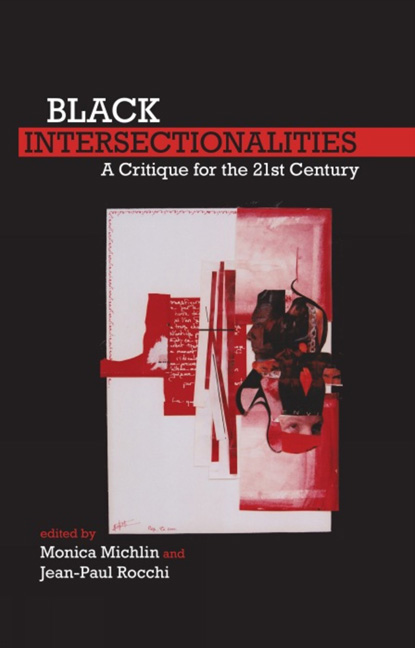Book contents
- Frontmatter
- Contents
- 1 Introduction: Theorizing for Change: Intersections, Transdisciplinarity, and Black Lived Experience
- 2 Exordium: Writing and the Relation: From Textual Coloniality to South African Black Consciousness
- I Challenging Hegemonic Gender Identities
- II Nonconformity and Narrative heorizing
- III Upsurges of Desire
- IV Epistemological Genealogies and Prospections
- 12 On the Monstrous Threat of Reasoned Black Desire
- 13 Revising Jezebel Politics: Toward a New Black Sexual Ethic
- 14 The Challenge of Black Feminist Desire: Abolish Property
- Contributors
- Index
12 - On the Monstrous Threat of Reasoned Black Desire
from IV - Epistemological Genealogies and Prospections
- Frontmatter
- Contents
- 1 Introduction: Theorizing for Change: Intersections, Transdisciplinarity, and Black Lived Experience
- 2 Exordium: Writing and the Relation: From Textual Coloniality to South African Black Consciousness
- I Challenging Hegemonic Gender Identities
- II Nonconformity and Narrative heorizing
- III Upsurges of Desire
- IV Epistemological Genealogies and Prospections
- 12 On the Monstrous Threat of Reasoned Black Desire
- 13 Revising Jezebel Politics: Toward a New Black Sexual Ethic
- 14 The Challenge of Black Feminist Desire: Abolish Property
- Contributors
- Index
Summary
There is a problem in the pursuit of knowledge that is peculiarly evident in the experience of many black graduate students. On the one hand, the student is often excited by the opportunity to pursue questions in a discipline whose resources for the advancement of knowledge have intoxicated him or her with a quest that may best be described as a faith in possibility. On the other hand, such a student often encounters subtle and at times not-so-subtle snippets of challenges to his or her intelligence that, in a context in which reputation about one's intelligence is paramount, is degrading. That student may resort to a defense mechanism that most scholars rely on – namely, the enduring value of ideas, of the life of the mind. But even in such retreat there is a lack of salvation since, as Frantz Fanon put it so well in 1952: “Quand je suis la, elle n'y est pas”; where it – in this case, reason – was, he was not (Fanon, 1952: 96).
Take the case of philosophy, where to seek such solace from its greatest voices often meant knocking at doors whose authors held signs tantamount to the phrase, “Whites only.” I recall, while a graduate student, discovering that most of my white peers went through a strange perceptual process when they read modern and contemporary canonical texts. When it came to the racist or sexist dimensions of the thought of authors such as John Locke, David Hume, Immanuel Kant, or G. W. Hegel, or even more recent exemplars such as Martin Heidegger or Bertrand Russell, they suffered from a blind spot, which, when pointed out, was often defended by their denial of the presence of bigotry in those authors’ writings: “Those things are not there,” they often proclaimed, or, after I showed them the offending passages, missed in spite of their previous “careful” readings, they argued that those sections were, in the end, harmless because, ultimately and supposedly, “irrelevant.” In one sense, it was as in the form of repression, as in the case where one might repeatedly walk along a beautifully adorned street without realizing, until after an enormous passage of time, that it includes a funeral parlor. At work was a form of theodicy in their readings of texts. They needed such dimensions to be extraneous.
- Type
- Chapter
- Information
- Black IntersectionalitiesA Critique for the 21st Century, pp. 178 - 194Publisher: Liverpool University PressPrint publication year: 2013



